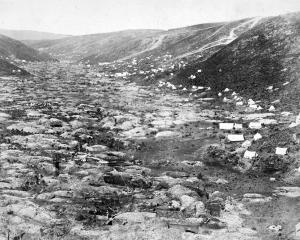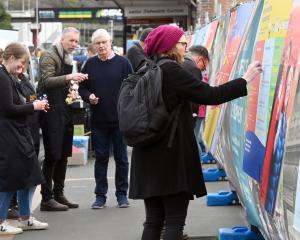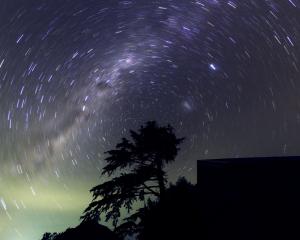Dunedin is the fifth biggest city in New Zealand yet is the third most expensive in which to be buried and the most expensive in which to be cremated. Shawn McAvinue talks to those involved to find out why the cost of dying in Dunedin has increased 62% in the past seven years, as have the calls for more burial options.
THE BUDDHIST
Dhargyey Buddhist Centre director Peter Small
Mr Small was the unofficial funeral director for the private cremation of a friend - a Tibetan Buddhist monk - on Otago Peninsula in 2011.
''Just as I felt a responsibility to care for him when he was alive, it felt natural and right to extend that care after he had left ... The process of private cremation was quite grounding during my time of grief.''
The cremation took weeks of planning and paperwork. Approval was needed from the chief medical officer of health, the Dunedin District Council, Otago Regional Council, Ngai Tahu, the Fire Service and neighbours had to be consulted. Despite the work, the cremation was not expensive, he said.
''We had a community to do the work, so we just had to buy some good firewood and materials to build a temporary brick structure.''
The ''biggest obstacle'' to the cremation was preparing and handling the body.
''That's the trickiest thing, really, to hold on to the body in a state which is not badly smelly to the point where it's a public health risk. That's what they are worried, about from a legislation side of things, and we were just fortunate we didn't arrive at that position.''
The dead monk lay on the bed for 18 days ''with no sign of decomposition'' and passed the regular checks by the health department.
Since the cremation, people had told him they were interested in private cremations, Mr Small said.
Private cremations should be accessible to anyone and not only religious groups and cultures.
''I was really proud to do it.''
Private cremations were not mentioned in the the Burial and Cremation Act 1964 or the proposed changes.
''I would be concerned if the increased regulations somehow closed off the opportunity for us to do a cremation again,'' he said.
THE FUNERAL DIRECTOR
Hope and Sons funeral directors manager Michael Hope.
About 1000 people died in Dunedin a year compared with 20,000 people in Auckland.
Funeral costs had increased for grieving families but so had available services.
Families wanted a good service to send off their loved ones.
Each year, Hope and Sons sold about 400 $1400 caskets, when there were $700 coffins available.
''Lots of older people say 'don't do anything when I'm gone - just put me in a wheelbarrow and wheel me out to Lawyers Head and tip me off', but actually when it comes to the crunch, people want it done in a dignified and respectful manner ... we look after people really well and we charge them $10,000 for the privilege.''
The most basic funeral cost $4500, which included such services as the cremation fee ($813.90), the Hope and Sons service fee ($1995 + GST), the cost of a hearse to the crematorium ($195 + GST) and a simple casket ($760.87 + GST).
''That's the absolute minimum we can do.''
The ''direct cremations'' were about 5% of work at the funeral home.
A Winz funeral grant - which was means-tested to a maximum grant of $1959 - was designed to pay for a funeral but did not cover basic funeral costs, which was a problem.
''The Winz grant lost all parity in the early 1980s, when inflation went crazy and the Government didn't adjust the grants.''
Hope and Sons' prices had increased between 2% and 4% a year, with the exception of a 10% increase about 10 years ago, when it realised the face of funerals had changed.
''My dad ran this business with four brothers. There were four funeral directors, two guys out the back and a lady in the office. Well, I've got 26 staff now, I have eight fulltime funeral directors, four fulltime embalmers and we are doing fewer funerals but the funerals are different.''
Funeral directors offered the bereaved audio and video services, slideshows and live streaming on the internet.
And the bereaved expected trained and qualified staff to be available 24 hours a day.
An average funeral cost between $9000 and $10,000 but could ''easily'' cost $12,000 to $15,000.
For a $12,000 funeral, half was for the funeral home's services, the other half was for contracted services, such as newspaper notices, catering and council fees, such as crematorium costs.
Hopes and Sons was on track to open a crematorium next year to compete with the only crematorium in Dunedin, which is owned by the Dunedin City Council.
''We will take some of their work away and they will struggle to pay some of their bills.''
He expected the council would increase its cremation prices, rather than control its costs.
''It's a different mentality altogether ... That's why the local authority shouldn't be in business.''
A BELL TOLLS - A CASH REGISTER RINGS
Comparing 2013-14 council fees of New Zealand cities for standard adult burial, maintenance and interment. (In population order):
1. Auckland: $4213 (Waikumete Cemetery - Auckland's largest)
2. Christchurch: $2267
3. Wellington: $2150 (Makara - Wellington's largest)
4. Hamilton: $4280
5. Dunedin: $3314
6. Tauranga: $2700
7. Lower Hutt: $2136
8. Palmerston North: $2540
9. Napier: $2665
10. Porirua: $1953
11. Invercargill: $1340
CREMATION:
1. Auckland: $564 (Waikumete Cemetery)
2. Christchurch: N/A (All privately owned)
3. Wellington: $685 (Makara Cemetery)
4. Hamilton: $560
5. Dunedin: $814
6. Tauranga: $440
7. Lower Hutt: N/A (All privately owned)
8. Palmerston North: $522
9. Napier: N/A (All privately owned)
10. Porirua: $483
11. Invercargill: $655
THE BURIAL AND CREMATION ACT 1964
Law Commission Senior researcher and policy adviser Cate Brett, an expert in cemeteries and crematoria, said the Act had remained substantially unchanged since it was enacted and mostly reflected 19th-century legislation.
''It is really driven by the growing awareness in Victorian England of public health risks presented by bodies that have been disposed of in an unsanitary fashion.''
The commission called for public submissions last year on its proposal to review the Act to reveal if it was fit for purpose in modern New Zealand and if more options should be available to bereaved New Zealanders.
Commission legal and policy adviser Eliza Prestidge Oldfield said the commission proposed that funeral directors should have to reveal their pricing structure for each service provided.
''We are not going as far as the United States, to suggest that people should be able to say 'I just want this', or 'I just want that', but we do think that is likely to become more common as a result of the disclosure.''
THE COUNCIL WORKER
Dunedin City Council community and recreation services manager Mick Reece
The Dunedin City Council administers and maintains 20 cemeteries and one crematorium in Dunedin in accordance with the Burials and Cremation Act 1964.
It is the fifth-biggest city in New Zealand and is the third most expensive in which to be buried and the most expensive in which to be cremated. It costs $3314 to be buried in Dunedin - more than Christchurch and Wellington - and nearly two and-a-half times the cost of Invercargill's $1340.
But in the cremation stakes Dunedin wins with a cost of $814, compared to Auckland's $564 and Wellington's $685.
Between 2007-08 and 2013-14 costs for burial rights and cremation in Dunedin have increased 62%.
Mr Reece said 80% of those who died in Dunedin were cremated, higher than the national average and the council crematorium fees were set to cover operating costs.
The council had tried to benchmark cremation and burial fees against other New Zealand cities but had found it ''quite difficult'' to compare in terms of value of money.
The council stood by its cremation and burial costs and believed Dunedin was ''on a par'' with cities of similar size.
''We try and keep costs as low as possible and that's the best we can do ... compared to other cemeteries in New Zealand the level of service in Dunedin is reasonably high ... we are not saying that savings and efficiencies can't be made but it is about the level of expectation of service ... it's about improving, or keeping up the level of service.''
The 44% increase in burial costs and cremation between 2008 and 2012, from $1172 to $1688, surprised him.
''If that's what they've increased I'm surprised ... really - wow - are you sure?''
For burial and crematorium services, either the user paid or the ratepayer paid, he said.
At a Law Commission public meeting in November, commissioner Wayne Mapp asked Mr Reece if the city's ''very high levels of debt played on its decision'' on setting cremation and burial costs.
''It's a factor,'' Mr Reece said.
However, the council had not asked for significant savings to be made, but expected efficiencies, he said.
When Mr Mapp asked him the cost of a burial or cremation in Dunedin he could not provide an answer.
''I'd have to go to the annual plan fees and charges - I'm sorry.''
Hope and Sons funeral directors manager Michael Hope provided Mr Mapp with an answer.
''About $3500.''
Mr Mapp said the cost was ''quite high'' because Christchurch was ''$2000 odd''.
Mr Reece told Mr Mapp getting ''true costs'' to compare between councils was ''pretty hard''.
INCREASING COSTS
DUNEDIN CITY COUNCIL
Costs at Allanton, Andersons Bay, Green Park, Portobello, Broad Bay, Macandrew Bay, Northern, Southern, Green Island, Port Chalmers, West Taieri, East Taieri and Waikouaiti.
BURIAL RIGHTS ADULT
2007-08: $1172
2008-09: $1219
2009-10: $1353
2010-11: $1488
2011-12: $1688
Five-year increase: 44%
2013-14: $1903.40
UNDER 10 YEARS
Green Park and East Taieri
2007-08: $589
2008-09: $613
2009-10: $680
2010-11: $748*
2011-12: $849
Five-year increase: 44%
2013-14: $957.40
CREMATORIUM COSTS ADULT
2007-08: $501 ($600 for Saturday and public holiday)
2008-09: $521 ($624)
2009-10: $578 ($693)
2010-11: $636 ($762)*
2011-12: $722 ($865)
Five-year increase: 44% (44%)
2013-14: $813.90 ($975.80)
CHILD UNDER 10
2007-08: $88 ($121 for Saturday and public holiday; babies under 48 hours $17)
2008-09: $92 ($126; $18)
2009-10: $102 ($140;$20)
2010-11: $112 ($154;$22)*
2011-12: $127 ($174; $24)
Five-year increase: 44% (44%; 41%)
2013-14: $143.50 ($195.80; $26.70)
Note: On October 1, 2010, a 2.5% GST increase was added.
WINZ BURIAL GRANTS: GRANTS TO SAY GOODBYE
Year/Funeral grants/ Average grant paid
2008 - 228 - $1610.84
2009 - 247 - $1615.01
2010 - 330 - $1676.85
2011 - 344 - $1781.47
2012 - 301 - $1789.23
You can't take it with you ...especially when you don't have it. More than 300 people were too poor to die in Otago and Southland in 2012. An Official Information Act request revealed that Work and Income (Winz) paid $538,558.23 in Otago and Southland in 2012 for funeral grants - a non-taxable lump sum payment to provide assistance towards funeral expenses.
Winz deputy chief executive Debbie Power said the grants helped people with ''necessary'' funeral costs such as professional services for preparing the body for cremation or burial, the cost of a casket, newspaper notice costs, hearse fees, compulsory fees for buying a burial plot or cremation fees.
The maximum payout for the means-tested grant is $1959. Between 2008 and 2012 the average grant in Otago and Southland increased 11% but, in the same time, a burial plot in a Dunedin cemetery increased 44% and cremation increased 39%.












